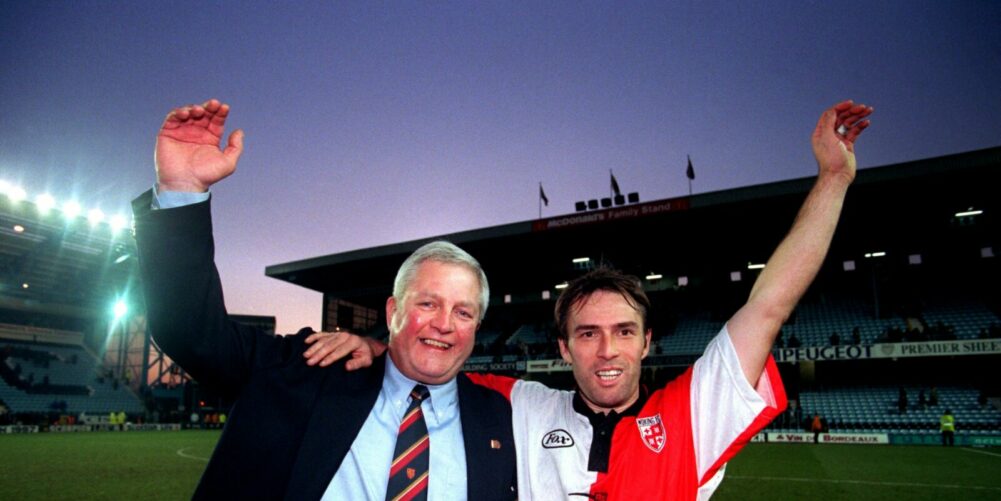GLORY DAYS: Woking midfielder Steve Thompson celebrates with manager Geoff Chapple after the famous draw at Coventry City. Picture: PA Images
By Steve Tervet
“What do you make of Woking?”
John Motson's question was innocent enough as he put it to Gary McAllister that the part-timers from Surrey, having just taken Premiership opposition all the way in their FA Cup third round replay, were a better side than their GM Vauxhall Conference status suggested.
But the Coventry City captain was terse in reply.
“It suggests some of their players can only turn it on for one game a season,” McAllister said. “I don't understand that. If these guys really want to work at it, they should be playing at a higher level.”
There was relief in McAllister's comments, a late own goal having spared the blushes of Gordon Strachan just two months into his first managerial role, but real feeling too.
“To be taken to that extent by a Non-League side was embarrassing for them,” said Woking's 39-year-old talisman Clive Walker. “They were angry. They'd convinced themselves we were equally as good as them over two games and it worried them.
“I've spoken to Gordon Strachan since and he said it was his worst nightmare. They were losing their pride and we knew we'd got to them. The more dirty tricks they tried, the more we thought it was funny.”
Captain Kevan Brown added: “They were shell-shocked. Maybe we put their noses out of joint in the sense that little old Woking had given them so many problems. They didn't expect us to play the sort of football we did.”
“There was a mini punch-up in the dressing-room,” said Cards boss Geoff Chapple. “It all spilled over and our dressing-room door came caving in.”
Strachan, furious with his own players after the first game at Highfield Road, “kicked off” at Kingfield. “He knew he'd got away with one,” striker Darran Hay recalled.
“He could easily have come unstuck. It showed what we were capable of and the level of players we had. We were playing one-touch football better than a Premiership side.”
Chapple summed it up. “The way we played in those two games told me the team I had was far better than where we were.”
Yet the Cards finished 1996/97 down in fifth, so perhaps McAllister had a point. Woking, at their best, were peerless during Chapple's five-year Conference tenure. Match of the Day highlights show them outplaying Coventry in the bad-tempered replay while Steve Thompson's last-minute equaliser in the first meeting finished off a slick passing move which had the Sky Blues chasing shadows.
It was a similar story at Cambridge – flying high in Division Three – in the second round, Millwall having already been despatched at The Den. Woking, conquerors of West Brom six years earlier, also knocked Football League Barnet out of the FA Cup two years running. Coventry was no one-off.
“You need to step up in the big games and we had so many players who could,” said winger Scott Steele. “The bigger the crowd, the better we played. There was always another gear to find.”
Steele was plucked from Airdrie's reserves after sending his video highlights south of the border. He lived rent-free with Chapple for two years and repaid the manager tenfold.
“The team was very settled,” he said. “I knew if I was fit, he would play me. I had a free role and when it was Clive and Darran up front, it was very easy.”
Hay said: “We were taking the p**s at times. You could see when Scotty and Clive conjured something but everyone understood the importance of their role. The other players would get on your back if it wasn't good enough; there was professional pressure.
“They wouldn't be frightened to call you out on the pitch and that made us winners. We almost got to a point where we knew we weren't going to lose.”
Goalkeeper Laurence Batty said: “There was a confidence in each other and we believed we could beat anybody. We loved playing together and we loved partying together. All the pieces of the jigsaw were in the right places, that was Geoff's strength.”
Chapple was as enigmatic as his team. With three promotions under his belt, he'd already been written into Woking folklore and the ‘picture painter' was able to inspire FA Cup magic year after year.
Yet the players recall how he didn't take training and essentially kept his team talks to three words: pass and move. Chapple said: “I liked to play a certain way, everything on the floor.
“I hated the ball being upstairs so the players I looked at had to have a bit of that.
“I used to watch Chelsea when Peter Osgood was there and what a lovely way to play football. All along the deck, in, out, pass, move, fantastic, loved it.”
Brown said: “The way Geoff wanted to play was a real pleasure. It was unusual for clubs at that level but we'd play with so much confidence. We had a great connection with the fans and you could really feel the atmosphere. There was a buzz about the place and we felt unbeatable.”
Woking finished a respectable eighth in their maiden Conference campaign but one man turned them into genuine title contenders.
Walker had played in the League Cup final for Sunderland less than 10 years earlier but after leaving Brighton in 1993, the former Chelsea winger feared his career could be over.
He said: “I was without a club at 36 and you start to panic. It was about survival. Woking seemed to be the correct move but it was a whole new world to me.
“My first away game was Northwich Victoria and our pre-match meal was in Knutsford Services on the M6. I didn't know what was going on so I had to learn as I went along.
“But I enjoyed training immensely and the lads were great.”
Sessions were Tuesday and Thursday night on the pitch at Kingfield.
Steele said: “We played five-a-side, old ones versus young ones. It was hell for leather and sadly we got beat a lot because the old ones were better. I used to go mad getting beat.
“There were so many winners in the dressing-room.
“There were more arguments between the players, if we were getting beat, than the management. It mattered so much.”
No player knew Chapple better than Lloyd Wye, who was already there when the manager arrived in 1984.
He said: “Geoff was never at the training ground but he knew a good player and he knew how he wanted them to play. He picked players who suited that style and who he could trust to do the job.
“We knew how we wanted our dressing-room mentality to be and we managed it ourselves.”
Batty added: “Geoff was a one-off in that he never did any tactics. He just picked the team. Geoff was very good at putting square pegs in square holes and he would always play the same formation.
“But sometimes that let us down because teams knew how to play against a 3-5-2. We never really had a Plan B.”
Macclesfield pipped Woking to the title in 1995; a year later it was Stevenage. As is so often the case, it wasn't top-of-the-table clashes which decided the championship.
Brown said: “We were better suited to playing Coventry in the FA Cup than Southport on a wet, windy evening where it was just a battle. Occasionally, we used to come unstuck in those games.”
Steele concurred: “There were times we went away to Gateshead with 500 people there and struggled. It's probably slightly unprofessional but that's the way it was.”
“The best team wins the league,” admitted Hay. “But if you asked every title-winning team from that era which side they feared most, it was us. We matched them home and away but it was the consistency we lacked.”
Whether a bigger squad, more detailed training, full-time status or extra financial backing would have made the difference – Wye wasn't alone in feeling “the professionalism of the club didn't match the ambition of the players” – Woking's golden generation will never know. But their brand of football throughout the Nineties may never be matched in Non-League's pragmatic top flight.
Walker said: “Winning was a priority but there were times, because we'd win by three or four goals – sometimes seven – that the fun came in. The players with a bit of cheekiness about them would try something ridiculous and if we didn't get away with it, the tough defenders would join in with the laughter. They wouldn't say ‘come on, take it seriously', they'd say ‘try it again'.
“Teams do well in certain stages: Liverpool of the 70s and 80s, United in the 90s, Barcelona when Messi turned up and Man City in recent times. It's a time when good players come together and understand the manager's philosophy. That's where we were at that time.”
Steele said: “The things we did and the way we won, I would do it again tomorrow. Maybe people thought McAllister was an a******* for what he said but I think he realised ‘this team are so good, why are they in that league?'. He was totally right.
“It haunts me that I never played in the League but we're so fortunate Geoff got us all together at the right time. If I'd played for Woking for ten years and we'd gone into the League, would there have been so many good times? No chance.”
What happened next?
Geoff Chapple resigned as Woking manager in May 1997 after almost 13 years in charge.
He'd just led the Cards to their third FA Trophy triumph in four seasons but wasn't offered a contract by incoming chairman Jon Davies.
Woking turned to European Cup winner John McGovern as his replacement but neither supporters nor the club's board warmed to his style of play.
However, striker Darran Hay said: “I really enjoyed playing under John.
“He was a hard taskmaster but had a simple view of the game, a bit like his former manager (Brian Clough). I thought he was outstanding.
“I scored quite a few goals for John. I was gutted when he left and sad that he didn't get enough time.”
Woking finished third under McGovern in 1997/98 despite losing six of their first seven games. The man in the dugout at the end of the decade was Brian McDermott, who would later take charge of Reading in the Premier League.
But McDermott's only full season in charge saw the Cards drop to ninth, their worst Conference finish to that point, and he was sacked months later.
Winger Scott Steele added: “Brian did his homework but it never worked for him. He was brilliant at certain things but it was a weird time. The club was in a big transition and things weren't right.”





















